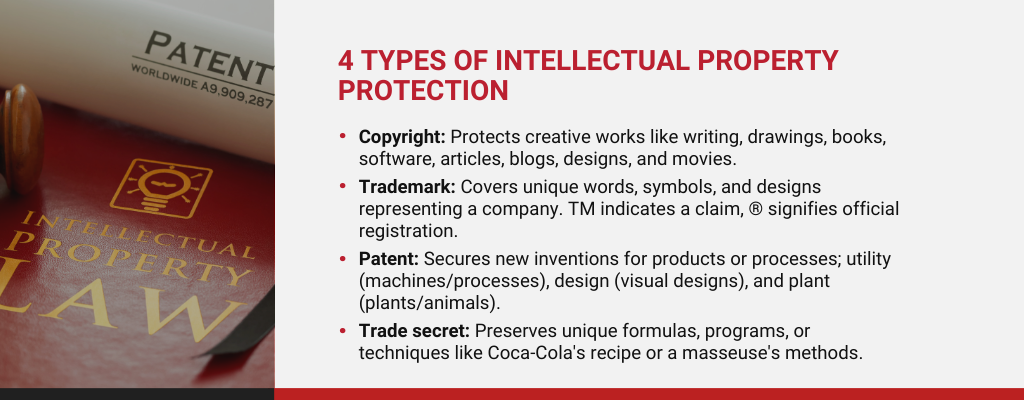The term ‘intellectual property’ has gained significant prominence in today’s rapidly evolving business landscape. Intellectual property rights are instrumental in shaping the modern economy, driving innovation, and providing protection. They also safeguard creative endeavors, facilitating business growth.
This article delves into the essential aspects of intellectual property rights, shedding light on their importance, types, and key role in fostering creativity, competition, and growth.
What is intellectual property?
In Indonesia, intellectual property (IP) includes various “products of the mind,” like inventions, writing or literature, art, designs, logos, and other intangible assets. The advancement of business and technology has introduced different forms of IP, such as geographical indications, sound trademarks, three-dimensional trademarks, and holograms.
The purpose of intellectual property
In today’s knowledge-based economy, businesses perceive IP as precious assets, so they are cautious in finding and safeguarding IP. Creating valuable intellectual property takes a lot of effort and time from skilled workers, which requires significant investments.
It means organizations and individuals put a lot of resources into it, and it should only be used with permission. Hence, getting value from IP and preventing others from benefiting from it is a big responsibility for any company.
Moreover, IP can come in many forms. Although intangible, IP can be more valuable than a company’s physical assets.
Read more: 15 strategies for global business expansion in Indonesia
The types of intellectual property protection

Having IP can help a company stand out from its competitors. Businesses should take several measures to protect their IP seriously. There are at least four major IP protection types, as listed below:
1. Copyright
Creative works like writing or drawing belong to this type of protection. Types of products covered by copyrights include books, software, drawings, articles, blogs, designs, and movies.
2. Trademark
Any unique words or combinations of words, symbols, and designs created to represent a company should obtain trademark protection.
The symbol TM after a comment indicates your claim of trademark protection, while ® signifies that the trademark has received official registration.
3. Patent
Patent protection is granted to new inventions for products or processes, giving the owner the authority to control how their idea is used. There are three types of patents: utility (for processes or machines), design (original visual designs), and plant (for plants and animals).
4. Trade secret
Trade secret protection is given to unique formulas, programs, or techniques you create that belong to you (think of Coca-Cola’s secret recipe for its drinks or a masseuse’s unique designs).
What is intellectual property infringement?
IP has certain rights, better known as Intellectual Property Rights (IPR). These rights cannot be infringed upon by people who are not allowed to use them or use them without authorization. IPRs let owners stop others from copying, imitating, or using their work without permission.
How does the infringement occur?
IPR infringement can be dreadful to the rightful owner. Legal action that might end up in court must be taken when infringement occurs. Here are the primary types of IP infringement that you may encounter.
1. Copyright infringement
When an unauthorized party makes a copy of all parts of something original, such as a work of art, music, or a book, it can be considered a copyright violation. The duplicated content does not have to be precisely the same as the original to qualify as an infringement.
2. Trademark infringement
An unauthorized business or individual using a licensed trademark or a mark that looks similar to the licensed trademark can be considered trademark infringement. The possible case can be a competitor company that uses a similar trademark to disrupt the rival’s business and gain benefit from their customer bases.
Another example is businesses in different industries that use the same or similar marks to benefit from the strong brand reputation of other companies.
3. Patent infringement
Patent infringement occurs when an individual or a company utilizes a patented invention without obtaining the necessary permission, violating its legal protection.
4. Trade secret infringement
Trade secrets are commonly safeguarded through non-disclosure agreements (NDAs).
Suppose a party in the agreement shares a trade secret, either wholly or partially, with people who are not involved or interested. In that case, they have broken the contract and violated the secrecy of the trade secret. It is also possible to commit trade secret infringement even when there is no NDA in place.
Tips to avoid IP infringement
Infringement often happens unknowingly in business. To avoid legal problems concerning IP, companies should ensure they are not utilizing copyrighted or trademarked content. It is important to confirm that their brand or logo does not closely resemble others, which could lead to confusion.
Moreover, conducting a patent search is advisable to verify the originality of ideas, and if they are not original, proper licensing channels should be explored. Specialized IP lawyers can assist in ensuring that no protected IP belonging to others is being used.
In addition, when hiring individuals for creative work, businesses should ensure that the contracts explicitly state that any created content becomes the property of the company, not the individual.
Conclusion
In today’s world, which relies heavily on a knowledge-based economy, intangible assets such as IP can offer more value to businesses than the company’s tangible assets.
Technological advancement has increased businesses’ urgency to protect their intellectual property from being misused by irresponsible parties from benefiting from it.
Against this backdrop, businesses operating in Indonesia can consider securing IP protection through trademark registration.
InCorp Indonesia provides assistance services to help your business acquire its trademark, ensuring legal protection for its intellectual property in Indonesia.
Click the button below to find out how we can help you.
Get in touch with us.
What you'll get
A prompt response to your inquiry
Knowledge for doing business from local experts
Ongoing support for your business
Disclaimer
The information is provided by PT. Cekindo Business International (“InCorp Indonesia/ we”) for general purpose only and we make no representations or warranties of any kind.
We do not act as an authorized government or non-government provider for official documents and services, which is issued by the Government of the Republic of Indonesia or its appointed officials. We do not promote any official government document or services of the Government of the Republic of Indonesia, including but not limited to, business identifiers, health and welfare assistance programs and benefits, unclaimed tax rebate, electronic travel visa and authorization, passports in this website.


